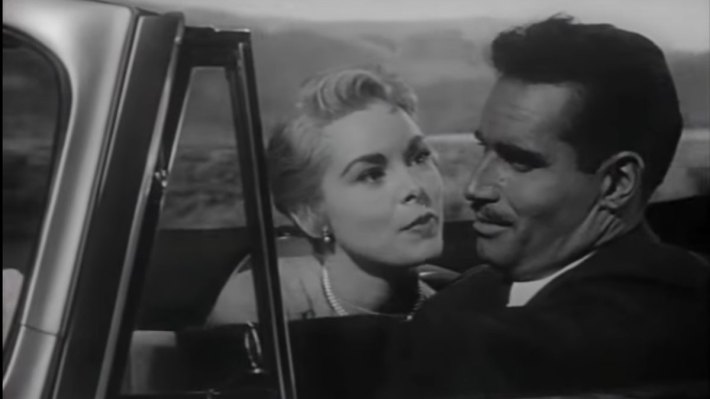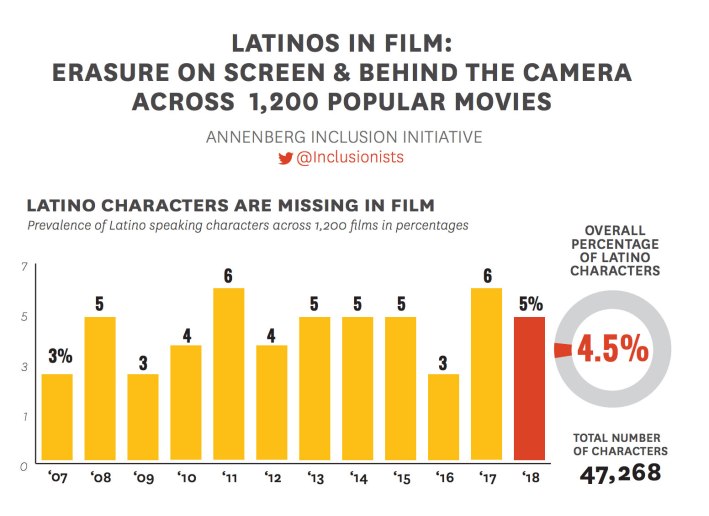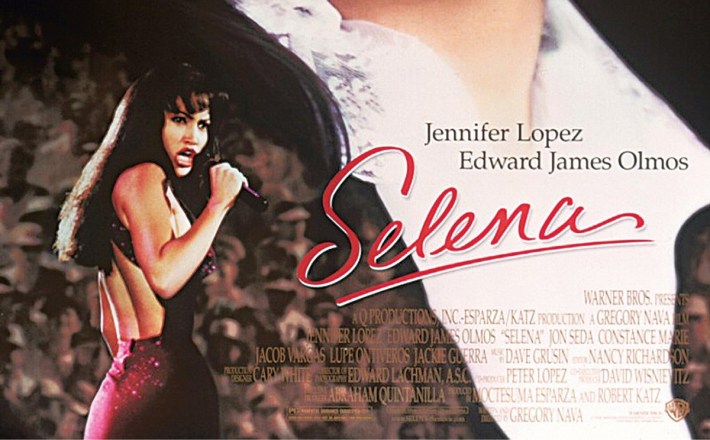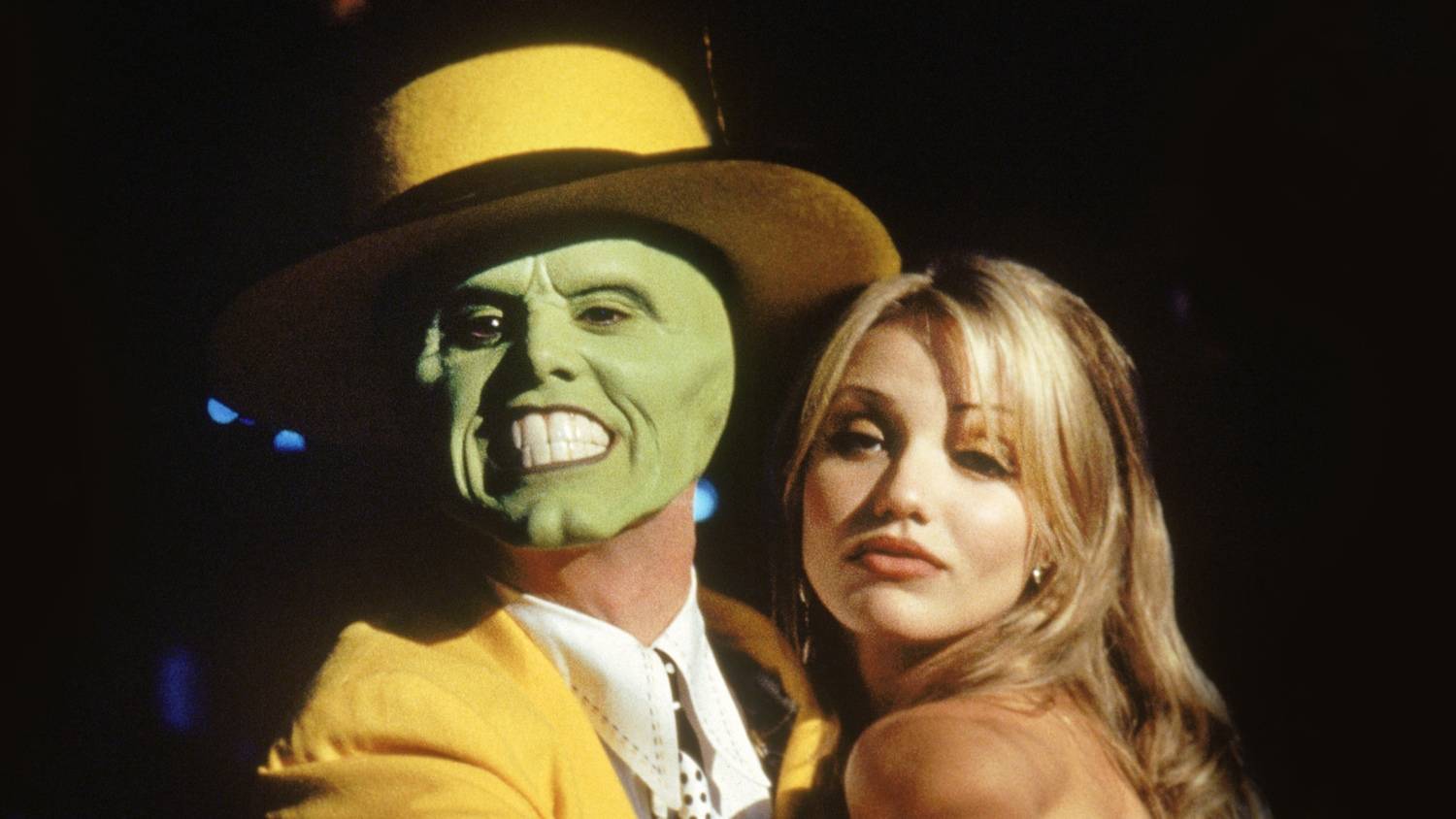[dropcap size=big]T[/dropcap]ake a chance on me, Hollywood. I’m the Latinx, Latino, Hispanic, Mexican-American filmmaker you’ve been not looking for your whole life. And, [white] man, boy do I have a script for you.
That’s been me for the better part of a decade. Not just me, thousands of invisible Latinx creatives have some version of this experience. It’s a mood, temporarily thrusted into the social media spotlight and turned into the fastest fading social justice movement of 2019 by a new report on Latinx representation in the movies.
Researchers at USC’s Annenberg Inclusion Initiative and NALIP put a hand over the mouth of Latinx Hollywood to see if it was still breathing. And guess what! Shit ain’t good, y’all. Like Charlton-Heston-playing-a-Mexican gumshoe-in-a-critically-acclaimed-Orson-Welles-noir not good. But it revealed what most of us who have struggled to make Latinx films have known for quite some time: The system that works for everyone else is broken for us.
So if Hollywood's powerful liberals are serious about improving Latinx representation, and they should be, people are going to have to take risks. But something great will come from it, like diluting racism and creating a whole new revenue stream while doing so.

The problem with the system is a cyclical erasure and appropriation likely not seen since the first Thanksgiving.
Since 2007, the top 1,200 films have featured Latinx actors in starring roles only 3% of the time. Most of them are Cameron Diaz. And that 3% is counting foreign-born actors, some of whom aren’t even Latin American. They’re European.
According to the report, “Only 4.5% of all speaking characters were Latino. This is 13.8 percentage points below U.S. Census. Despite all of the talk about diversity and inclusion in Hollywood and the popular press, these findings represent no change in depictions of the largest ethnic group in America, who also comprise 39% of the population of the state of California and 49% of Los Angeles’ population.” This despite the fact that Latinos have the highest moviegoing rate in the country.

This pattern is pervasive in every major role of filmmaking, from producers to sound operators and everything in between. It’s not because Latinx creatives aren’t talented, it’s because we aren’t seen. And because no one sees us, they don’t know how to package a film for us, about us, or by us.
The trouble with Hollywood not making almost any Latinx films 10 years ago or even 20 years ago, is that the vast majority of films it is investing into today are reboots from 10 and 20 years ago.
Tarantino is a proven brand. I know I went to watch the new Quentin film because it was the new Quentin film, not because of its original premise.
There are two models that work well for getting your project made: either packaging actors and directors on a project or making a movie about something well-known. They operate under the same premise of finding strong intellectual property. That intellectual property can be a novel, a TV show, a film franchise, a comic book, or even a person—someone that is so famous that they are themselves a big enough brand for risk-averse gatekeepers to take a chance on.

Quentin Tarantino, for example, with his film Once Upon a Time in Hollywood, has managed to make one of only two original films that passed $200 million at the global box office. Tarantino is a proven brand. I know I went to watch the new Quentin film because it was the new Quentin film, not because of its original premise. The other filmmaker that is fast establishing himself as a proven IP is Jordan Peele, whose original horror film Us, also crossed the $200 million mark.
White-centric films lose money all the time. But they don’t stop making those, they just figure out new ways to package or reboot or franchise. And they take chances in that space all the time.
When there is IP, like a Selena biopic or the recently released Eugenio Derbez vehicle based on Dora the Explorer, there is money to be made. Dora and the Lost City of Gold features a primarily Latinx cast and has made more than $63 million dollars since its release Aug. 9th. Thank God for that, or what would Hollywood's paper of record have used as the cover art for their news story on the Inclusion Initiative?
They’re going to have to take risks. They’re going to have to lose some money. That’s how you get Black Panther, Get Out, or Crazy Rich Asians.
But Latinx IP is sparse. It isn’t a joke. Most of the starring Latinx movie roles were given to Cameron Diaz, Jennifer Lopez, Eugenio Derbez, and Jessica Alba. That means, if you want to get a studio to greenlight or even option your film, you have those four people and about a dozen others you can try to get on board. And mad props to Eva Longoria who was just signed to direct Flamin' Hot, a biopic about Flamin’ Hot Cheetos inventor Richard Montanez. But they can’t star in every picture. Eva can't produce and direct every Latinx script.

When we talk about directors, the representation is just as limited. Only 28 Latinx directors worked across the 1,200 top films studied. Just one of those was a woman and 71 percent were international filmmakers. There are some powerful Mexican directors but when is the last time you saw Guillermo Del Toro, Alfonso Cuaron, or Alejandro Iñárritu make a film about the Latinx experience in America?
...Directors and actors sadly aren’t powerful enough to fix nearly 100 years of systemic oppression; more than 100 years of banditos, cholos, maids, sex objects, impoverished immigrants, and drug dealers.
The gatekeepers are afraid to lose money and will only make something that is already a proven commodity. That’s why they’ve optioned three Selena Quintanilla shows in the past two years. But the thing is, they’re going to have to take risks. They’re going to have to lose some money. That’s how you get Black Panther, Get Out, or Crazy Rich Asians. White-centric films lose money all the time. But they don’t stop making those, they just figure out new ways to package or reboot or franchise. And they take chances in that space all the time.

Getting a movie made is difficult, almost impossible for everyone, but for us, there is no almost. Just a bunch of pre-written tweets from well-known directors and actors (thank you!) who sadly aren’t powerful enough to fix nearly 100 years of systemic oppression; more than 100 years of banditos, cholos, maids, sex objects, impoverished immigrants, and drug dealers. It’s no wonder half the country supports a man who thinks we are criminals, rapists, and don’t contribute to society.
Peele and Tarantino, are proof that if you take a risk on a filmmaker with a vision, you could be rewarded with a hitmaker and Oscar contender.
But you can fix this, uber-powerful Hollywood producer. Give us a shot. Let us fail because that is the only way you can make something great.
Peele and Tarantino, are proof that if you take a risk on a filmmaker with a vision, you could be rewarded with a hitmaker and Oscar contender. Peele’s first film, Get Out, is a perfect example of letting a POC tell a story about their American experience and having it resonate on a whole other level, not to mention millions of profits for your shareholders.
That’s all we are asking. Let us tell an American story about Latinx characters. Perhaps a buddy comedy called Soccer Moms about best-friends-turned-enemies who put their entire lives on the line to win a stupid indoor soccer league trophy, and somehow prove who ultimately won in the game of life. Hint: It’s the white mom.
Judd Apatow, @me, bro.
RELATED: Once Upon a Time in Hollywood ... There Were Also Mexicans







